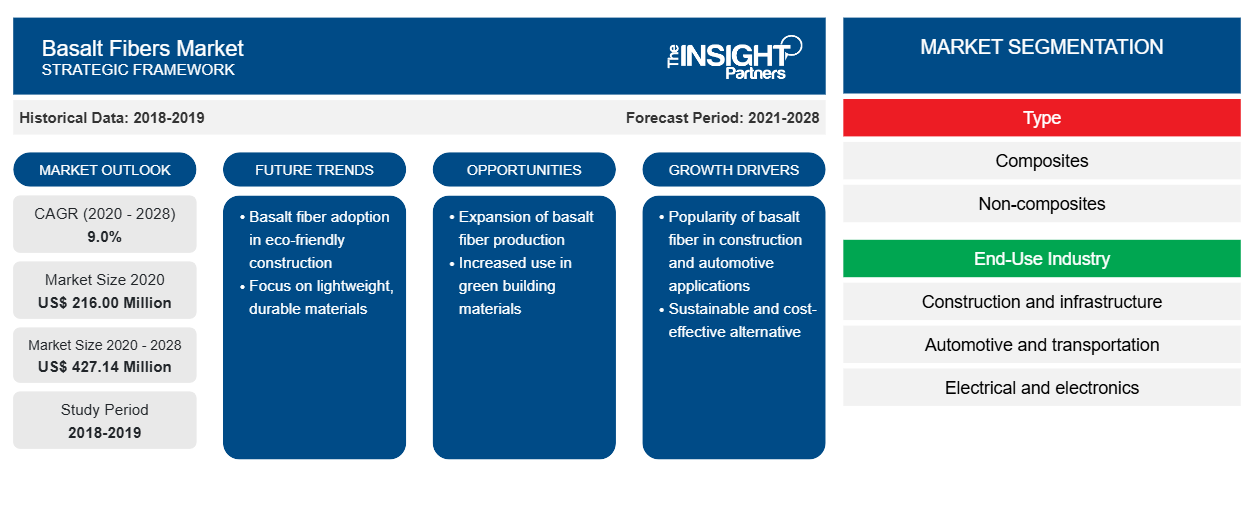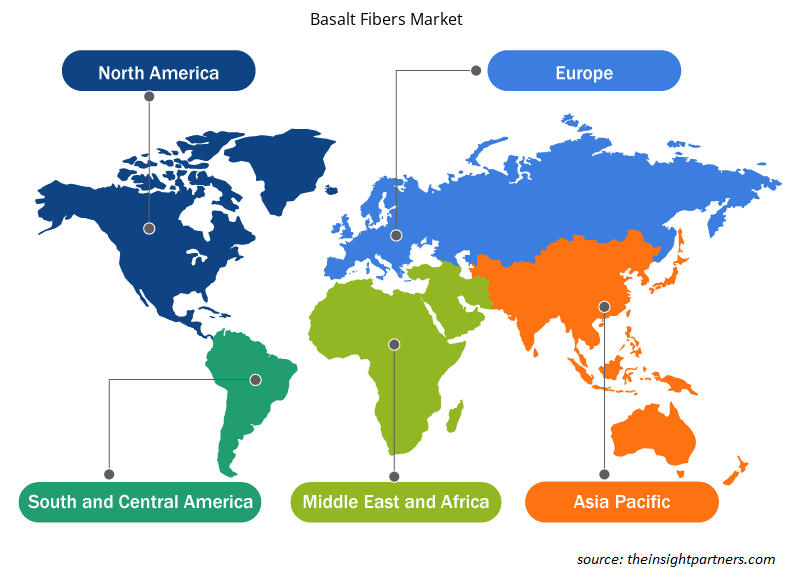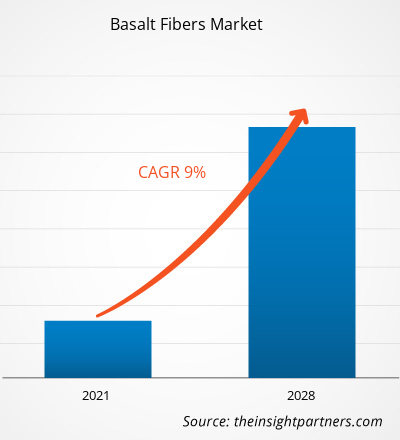The basalt fiber market was valued at US$ 216.00 million in 2020 and is projected to reach US$ 427.14 million by 2028; it is expected to register a CAGR of 9.0% from 2021 to 2028.
Basalt fiber possesses similar chemical properties to glass fibers but have better physicochemical properties than glass fibers. The basalt fiber market is anticipated to witness high growth due to its demand from end-use industries such as automotive, marine, building & construction, and electronics. Increasing construction activities in several regions due to growth in population, growing income, and government initiatives in various economies to develop better infrastructure is likely to boost the growth of the basalt fiber market. However, the inconsistent raw material properties are among the factors restraining the basalt fiber market growth.
In 2020, Asia Pacific accounted for the largest share in the global basalt fiber market. Asia Pacific continent comprises several developing and developed economies such as India, China, Japan, South Korea, and Australia. Emerging countries are witnessing an upsurge in industrialization and urbanization activities. Growth in construction projects in countries such as India and China and growing investments in infrastructure activities, such as the new construction of highways, railways, underground metro lines, and pavement linings, are predicted to bolster the basalt fiber market in the region.
Customize This Report To Suit Your Requirement
You will get customization on any report - free of charge - including parts of this report, or country-level analysis, Excel Data pack, as well as avail great offers and discounts for start-ups & universities
Basalt Fibers Market: Strategic Insights

- Get Top Key Market Trends of this report.This FREE sample will include data analysis, ranging from market trends to estimates and forecasts.
You will get customization on any report - free of charge - including parts of this report, or country-level analysis, Excel Data pack, as well as avail great offers and discounts for start-ups & universities
Basalt Fibers Market: Strategic Insights

- Get Top Key Market Trends of this report.This FREE sample will include data analysis, ranging from market trends to estimates and forecasts.
Impact of COVID-19 Pandemic on Basalt Fiber Market
The ongoing pandemic has drastically altered the status of the chemical and materials sector and negatively impacted the growth of the basalt fiber market.The implementation of measures to combat the spread of the virus has impacted the growth of several industrial sectors. Industries such as construction, automotive, chemical, and electronics have been impacted by the sudden distortion in operational efficiencies and disruptions in the value chains attributable to the sudden closure of national and international borders. The significant decline in the growth of several industrial sectors severely impacted the demand for basalt fibers in the global market. However, as the economies are planning to revive their operations, the demand for basalt fiber is expected to rise globally. The expanding demand for basalt fibers in various industries such as construction, automotive, chemical, electronics, and aerospace along with significant investments by prominent manufacturers is expected to drive the growth for basalt fibers.
Market Insights
Wide Applications of Basalt Fibers in Various End-Use Industries to Drive its Market Growth
Basalt fibers have a wide scope of applications in various end-use industries, such as construction, automotive, electrical and electronics, chemical, aerospace, and marine. In construction, chopped basalt strands are used to increase cracking resistance of cement panels. Due to basalt fiber’s unique chemical stability in extreme conditions, they can be used in many concrete structures, such as bridges, tunnels, dams, and floors. Basalt fibers are used in the chemical industry in the production of chemical-resistant pipes, protective coatings, storage tanks for corrosive liquids, chemical fertilizers, acids, toxic substances, etc. As the application of basalt fibers are deepening, and the market demand for basalt fiber is increasing at a faster rate.Product Insights
Based on product, the global basalt fiber market is segmented into roving, chopped strand, twisted yarn, fabrics and tapes, and others. The roving segment held the largest share in the global basalt fiber market in 2020. Basalt roving is a bundle of continuous unidirectional complex basalt fibers. Roving has resistance to aggressive environments, high natural strength, long service life, and superior electrical insulation properties. Based on its technical characteristics, basalt roving surpasses E-glass and S-glass in numerous respects. Basalt roving is extremely heat-resistant and can resist temperatures up to 1,000 °C for a short time.
Kamenny Vek Company; Fiberbas Construction and Building Technologies; Hydro Design Management Co. Pvt. Ltd.; Hg Gbf Basalt Fiber Co., Ltd; Bastech; Mafic SA; Shanxi Basalt Fiber Technology Co. Ltd; Technobasalt-Invest LLC; Deutsche Basalt Faser Gmbh; and Basalt Engineering LLC are among the major key players operating in the global basalt fiber market.
Report Spotlights
- Progressive industry trends in the basalt fiber market to help players develop effective long-term strategies
- Business growth strategies adopted by developed and developing markets
- Quantitative analysis of the basalt fiber market from 2019 to 2028
- Estimation of global demand for basalt fiber
- PEST analysis to illustrate the efficacy of buyers and suppliers operating in the industry
- Recent developments to understand the competitive market scenario
- Market trends and outlook as well as factors driving and restraining the growth of the basalt fiber market
- Assistance in decision-making process by highlighting market strategies that underpin commercial interest, leading to the market growth
- The size of the basalt fiber market size at various nodes
- Detailed overview and segmentation of the market, as well as the basalt fiber industry dynamics
- Size of the basalt fiber market in various regions with promising growth opportunities
Basalt Fibers Market Regional Insights
The regional trends and factors influencing the Basalt Fibers Market throughout the forecast period have been thoroughly explained by the analysts at Insight Partners. This section also discusses Basalt Fibers Market segments and geography across North America, Europe, Asia Pacific, Middle East and Africa, and South and Central America.

- Get the Regional Specific Data for Basalt Fibers Market
Basalt Fibers Market Report Scope
| Report Attribute | Details |
|---|---|
| Market size in 2020 | US$ 216.00 Million |
| Market Size by 2028 | US$ 427.14 Million |
| Global CAGR (2020 - 2028) | 9.0% |
| Historical Data | 2018-2019 |
| Forecast period | 2021-2028 |
| Segments Covered |
By Type
|
| Regions and Countries Covered | North America
|
| Market leaders and key company profiles |
Basalt Fibers Market Players Density: Understanding Its Impact on Business Dynamics
The Basalt Fibers Market is growing rapidly, driven by increasing end-user demand due to factors such as evolving consumer preferences, technological advancements, and greater awareness of the product's benefits. As demand rises, businesses are expanding their offerings, innovating to meet consumer needs, and capitalizing on emerging trends, which further fuels market growth.
Market players density refers to the distribution of firms or companies operating within a particular market or industry. It indicates how many competitors (market players) are present in a given market space relative to its size or total market value.
Major Companies operating in the Basalt Fibers Market are:
- Kamenny Vek Company
- Fiberbas Construction and Building Technologies
- Hydro Design Management Co. Pvt. Ltd.
- Hg Gbf Basalt Fiber Co., Ltd
- Bastech
Disclaimer: The companies listed above are not ranked in any particular order.

- Get the Basalt Fibers Market top key players overview
Global Basalt Fiber Market
By Product
- Roving
- Chopped Strand
- Twisted Yarn
- Fabrics and Tapes
- Others
By End-Use Industry
- Construction
- Automotive
- Electrical and Electronics
- Chemical
- Others
Company Profiles
- Kamenny Vek Company
- Fiberbas Construction and Building Technologies
- Hydro Design Management Co. Pvt. Ltd.
- Hg Gbf Basalt Fiber Co., Ltd
- Bastech
- Mafic SA
- Shanxi Basalt Fiber Technology Co. Ltd
- Technobasalt-Invest LLC
- Deutsche Basalt Faser Gmbh
- Basalt Engineering LLC
Frequently Asked Questions
Which region held the fastest CAGR in the global basalt fiber market?
Asia-Pacific is estimated to register the fastest CAGR in the market over the forecast period. Asia Pacific comprises several economies such as India, China, Japan, South Korea, and Australia. These countries are witnessing an upsurge in industrialization and urbanization activities, offering ample opportunities for the key market players in the basalt fiber market. In Asia Pacific, there has been an increase in the consumption of basalt fiber in various industries, such as wind energy, construction & infrastructure, electrical & electronics, and automotive. Along with this, the rise in awareness regarding sustainable living and environment-friendly materials used in the application of infrastructure, aerospace, and other industries boosts the demand for basalt fibers in the region. Features of basalt fiber such as low cost, easy availability, and increasing production capacities bolster the growth of the basalt fiber market in Asia Pacific.
Based on end-use industry, which segment is expected to grow at the fastest rate during the forecast period?
Based on end-use industry, automotive segment led the global basalt fiber market during the forecasted period. Basalt fiber has various properties such as high mechanical strength, resistance to high temperature, durability, and chemical resistance. It is also environmentally friendly. Such properties make basalt fiber an ideal material to be used in the automotive industry to produce headliners, CNG cylinders, brake pads and clutch plates, thermo insulation for exhaust systems, muffler’s filler, interior and exterior parts, and thermoplastic parts. Basalt fiber is lighter than steel. The fiber has high mechanical strength and an extended range of working temperatures. It is cost-effective along with excellent recyclability. All these properties made basalt fiber one of the ideal materials to be used to produce CNG cylinders.
Based on end-use industry, which segment is leading the global basalt fiber market during the forecast period?
On the basis of end-use industry, construction segment is leading the basalt fiber market during the forecast period. Basalt fibers are primarily employed in the construction industry as it has a higher strength than steel and is resistant to electromagnetic radiations and ultraviolet rays. Basalt fiber is three times lighter than steel and is 2.5 times stronger in tensile strength than steel. It also has an extremely lower coefficient of heat conductivity than steel, which improves energy efficiency. In the construction industry, basalt fiber is used in various applications, such as in the usage of wet or dry chopped strand for premix technology, basalt roving for spray up and shotcrete technologies, high strength roving for the manufacturing of rebars and pultruded profiles, and basalt fiber fabrics for concrete reinforcement and building thermo insulation.
Based on product, which segment is expected to grow at the fastest rate during the forecast period?
Based on product, fabrics and tapes segment is expected to grow at the fastest CAGR from 2021 to 2028. Basalt woven and knitted fabrics are mostly manufactured from direct roving, twisted yarns, special weaving, and knitting machines. Basalt fabrics are generally used for producing structural-basalt plastics, which are based on various thermosetting binders. It can also be used as a base when manufacturing soft and rigid roofing as well as for electrotechnical purposes to produce insulation materials. The basalt fiber tapes are used with resin and are compatible with polyester, epoxy, and vinyl ester. These tapes are used for the selective reinforcement of laminates, sleeve or pipe winding, seams, and molding. The finished edges of the basalt fiber provide easy handling and a clean, finished appearance, which prevents the tape from unraveling.
Can you list some of the major players operating in the global basalt fiber market?
The major players operating in the basalt fiber market are Kamenny Vek Company, Fiberbas Construction and Building Technologies, Hydro Design Management Co. Pvt. Ltd., Hg Gbf Basalt Fiber Co., Ltd., Bastech, Mafic SA, Shanxi Basalt Fiber Technology Co. Ltd., Technobasalt-Invest LLC, Deutsche Basalt Faser Gmbh, and Basalt Engineering LLC.
Which region held the largest share of the global basalt fiber market?
In 2020, Asia-Pacific held the largest revenue share of the global basalt fiber market. Asia-Pacific continent comprises several developing and developed economies such as India, China, Japan, South Korea, and Australia. These emerging countries are witnessing an upsurge in industrialization and urbanization activities, offering ample opportunities for the key market players in the basalt fiber market. Asia-Pacific region is anticipated to propel the basalt fiber demand owing to the presence of several domestic players in the vertical market segment such as construction and automotive. The basalt fiber market is expected to witness huge demand from the construction and automotive industries due to their resistance power to varying temperatures and chemicals, low water absorption, high mechanical strength, and durability. Besides, basalt fiber finds applications in marine, aerospace & defense, and others. The basalt fiber market is expected to rise during the projection period due to enormous growth in the automotive sector especially in countries including India and China. Additionally, the rising urbanization, rising population, and the presence of government support are the other drivers for the market growth in the region.
- Historical Analysis (2 Years), Base Year, Forecast (7 Years) with CAGR
- PEST and SWOT Analysis
- Market Size Value / Volume - Global, Regional, Country
- Industry and Competitive Landscape
- Excel Dataset
Testimonials
I wish to appreciate your support and the professionalism you displayed in the course of attending to my request for information regarding to infectious disease IVD market in Nigeria. I appreciate your patience, your guidance, and the fact that you were willing to offer a discount, which eventually made it possible for us to close a deal. I look forward to engaging The Insight Partners in the future, all thanks to the impression you have created in me as a result of this first encounter.
DR CHIJIOKE ONYIA, MANAGING DIRECTOR, PineCrest Healthcare Ltd.The Insight Partners delivered insightful, well-structured market research with strong domain expertise. Their team was professional and responsive throughout. The user-friendly website made accessing industry reports seamless. We highly recommend them for reliable, high-quality research services
Yukihiko Adachi CEO, Deep Blue, LLC.Reason to Buy
- Informed Decision-Making
- Understanding Market Dynamics
- Competitive Analysis
- Customer Insights
- Market Forecasts
- Risk Mitigation
- Strategic Planning
- Investment Justification
- Identifying Emerging Markets
- Enhancing Marketing Strategies
- Boosting Operational Efficiency
- Tracking Industry Innovations
- Aligning with Regulatory Trends
Yes! We provide a free sample of the report, which includes Report Scope (Table of Contents), report structure, and selected insights to help you assess the value of the full report. Please click on the "Download Sample" button or contact us to receive your copy.
Absolutely — analyst assistance is part of the package. You can connect with our analyst post-purchase to clarify report insights, methodology or discuss how the findings apply to your business needs.
Once your order is successfully placed, you will receive a confirmation email along with your invoice.
• For published reports: You’ll receive access to the report within 4–6 working hours via a secured email sent to your email.
• For upcoming reports: Your order will be recorded as a pre-booking. Our team will share the estimated release date and keep you informed of any updates. As soon as the report is published, it will be delivered to your registered email.
We offer customization options to align the report with your specific objectives. Whether you need deeper insights into a particular region, industry segment, competitor analysis, or data cut, our research team can tailor the report accordingly. Please share your requirements with us, and we’ll be happy to provide a customized proposal or scope.
The report is available in either PDF format or as an Excel dataset, depending on the license you choose.
The PDF version provides the full analysis and visuals in a ready-to-read format. The Excel dataset includes all underlying data tables for easy manipulation and further analysis.
Please review the license options at checkout or contact us to confirm which formats are included with your purchase.
Our payment process is fully secure and PCI-DSS compliant.
We use trusted and encrypted payment gateways to ensure that all transactions are protected with industry-standard SSL encryption. Your payment details are never stored on our servers and are handled securely by certified third-party processors.
You can make your purchase with confidence, knowing your personal and financial information is safe with us.
Yes, we do offer special pricing for bulk purchases.
If you're interested in purchasing multiple reports, we’re happy to provide a customized bundle offer or volume-based discount tailored to your needs. Please contact our sales team with the list of reports you’re considering, and we’ll share a personalized quote.
Yes, absolutely.
Our team is available to help you make an informed decision. Whether you have questions about the report’s scope, methodology, customization options, or which license suits you best, we’re here to assist. Please reach out to us at sales@theinsightpartners.com, and one of our representatives will get in touch promptly.
Yes, a billing invoice will be automatically generated and sent to your registered email upon successful completion of your purchase.
If you need the invoice in a specific format or require additional details (such as company name, GST, or VAT information), feel free to contact us, and we’ll be happy to assist.
Yes, certainly.
If you encounter any difficulties accessing or receiving your report, our support team is ready to assist you. Simply reach out to us via email or live chat with your order information, and we’ll ensure the issue is resolved quickly so you can access your report without interruption.















The List of Companies - Basalt Fiber Market
- Kamenny Vek Company
- Fiberbas Construction and Building Technologies
- Hydro Design Management Co. Pvt. Ltd.
- Hg Gbf Basalt Fiber Co., Ltd
- Bastech
- Mafic SA
- Shanxi Basalt Fiber Technology Co. Ltd
- Technobasalt-Invest LLC
- Deutsche Basalt Faser Gmbh
- Basalt Engineering LLC






 Get Free Sample For
Get Free Sample For